“Monday morning, the start of a brand new week and first thing in the morning, another child was on the server, demolishing his buildings, giving away all his belongings and talking of committing suicide.” – Stuart Duncan, Autcraft creator.
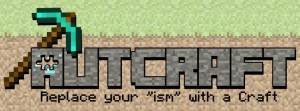
On the Autcraft server, on Minecraft, there is a place called the bully board – a noticeboard onto which kids can post their experiences with bullying and see for themselves that they’re not suffering alone.
It’s the brainchild of a popular player known on the server simply as ‘Skip’, a British teenager with a big heart, a fascinating blog and a gloriously bizarre and inspiring twitter feed. The bully board started out as a single in-game noticeboard of heartbreaking stories that exceeded its capacity tragically fast.
Now, the bully board is a vast underground chamber, made of quartz blocks and decorated with glow stones and lava flows. The kids write in books and on boards about how they are tormented by bullies, and the adults (the tireless team of helpers who support creator Stuart Duncan, aka. ‘AutismFather’ or simply ‘AF’) post messages of support.
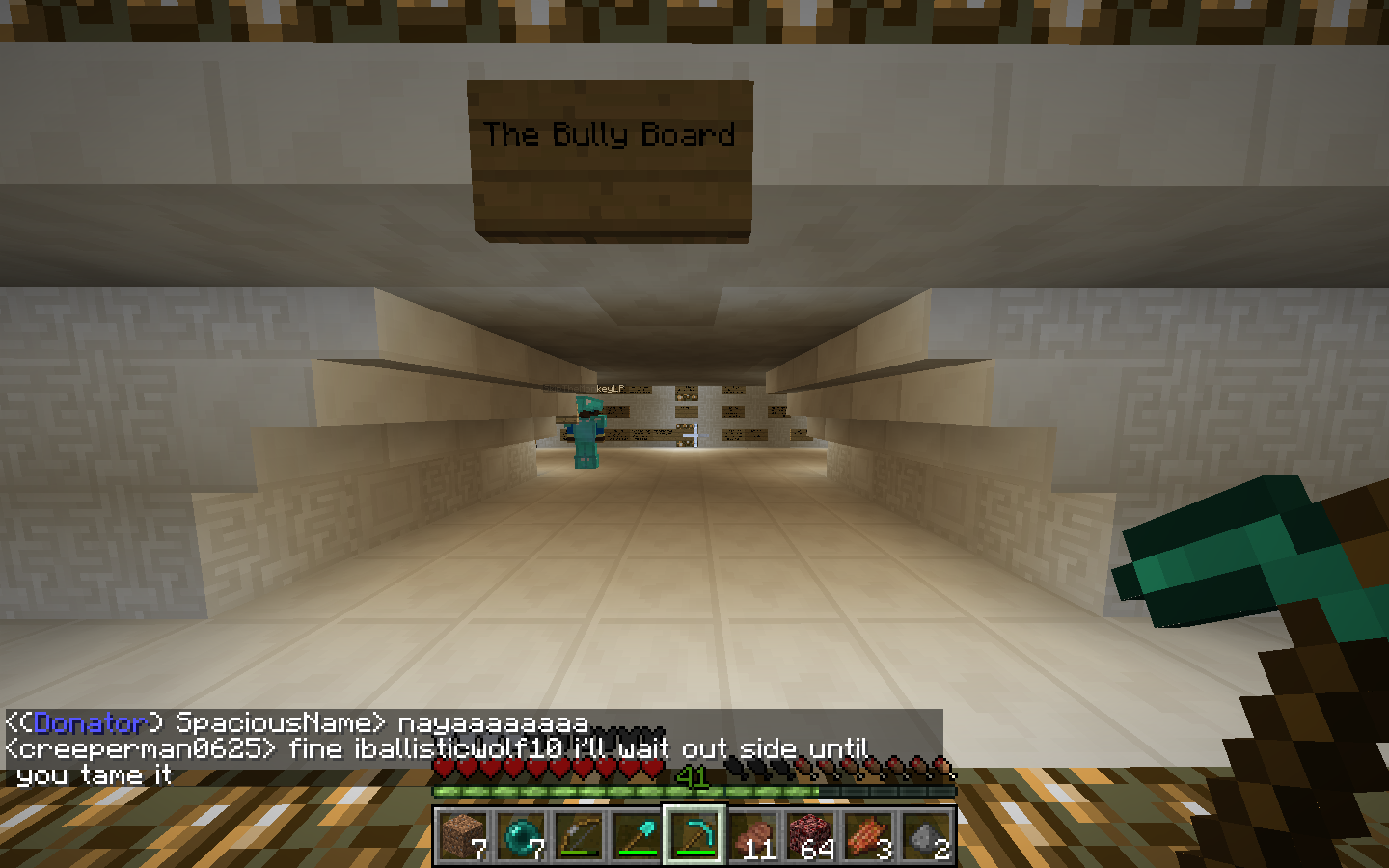
The bully board on Autcraft – Yes, I am aware that this picture has a certain ‘axe murderer POV’ quality to it. Click to enlarge.
After spending time with the wonderful people of Autcraft for my previous blogs, I was eager to contribute my own message of support to the bully board. When I came to do it though, something suddenly occurred to me:
What on earth can I say to autistic children who are relentlessly bullied every day of their lives?
I wasn’t sure I could even comprehend what some of these kids must be going through, much less dispense any kind of wisdom that will actually help. I often read Stuart Duncan’s excellent blogs about the bullying of autistic children and their terrifyingly high suicide rates. He is regularly contacted by severely bullied children who are in dire need of help and are right on the brink of ending it all.
I consider myself pretty good with words, but to devise one or two sentences of insight on that kind of problem seemed beyond me.
I spent a long time thinking about what to write, coming up with countless ideas followed by countless reasons why they weren’t good enough. Here are some of the different thoughts I considered posting on the bully board and why none of them seemed right:
“It gets better”
It’s not exactly original, but ever since I started following the ‘it gets better’ campaign to support bullied LGBT teenagers (another group with an obscenely high suicide rate), I’ve always loved the simplicity of this little three-word phrase.
It’s true – the social environment of school kids is so saturated with pressures, conflicts, hormones and cruelty that it’s incredibly hard to just…be. Adulthood brings, for most people, the chance to truly be yourself and explore your own passions and individuality in ways that just aren’t possible in school.
I thought that was a nice message to put across.
‘It gets better’ wasn’t right though. The campaign is a wonderful thing, but borrowing its monicker wasn’t going to work for me.
I sensed that in the bullying cases that Stuart Duncan is talking about, the cases where just getting through the day is fraught with distress and fear at the level of absolute boiling point, me lazily quoting someone else’s slogan would be of zero worth.
“You kids don’t know how amazing you really are”
I really wanted to write something like this because it’s so easy to say but so hard to make a victimised person believe it.
I had a very up and down time of it in school. I was bullied on rare occasions and, to my eternal shame, I was a bully myself on rare occasions. From what I remember, playground bullying was absolutely ruthless. With some bullies, it was like they had this vampiric bloodlust for the suffering of others and they were just addicted to it.
Like a heroin addict stealing from their own parents, these kids would relentlessly torment even their own friends and siblings, just to get that high of sapping another person’s self-esteem to fuel their own. (I don’t make the heroin comparison lightly, as I know heroin takes and ruins lives. But bullying does too.)
The playground truly is one of the harshest environments most people experience in their lifetimes and I don’t think I could deal with that now. When I consider that the level of bullying I witnessed, suffered and occasionally dispensed must be a mere fraction of what some of these kids experience, I find it hugely impressive that they have the strength to withstand it.
Then when you meet them on Autcraft and see how friendly, creative, smart and selfless they are, it’s really humbling. They deserve to know that they are amazing people and that their strength can take them anywhere they want to go as adults.
But they’re told that on Autcraft all the time. Whether they believe it or not, a bit of reiteration from me isn’t going to make a difference.
“Some people say bullying is ‘just what kids naturally do’ – don’t listen to them”
If you’ve read my blogs before, you may notice I have a tendency to boil things down to evolution. I find theories based on Darwinism especially seductive, but this causes a problem when it comes to bullying.
In nature, there is the concept of the ‘runt of the litter’: In any group of offspring, the weakest are marginalised, subdued and, in essence, bullied by the strongest. It works flawlessly as a means of genetic betterment. Those with the weakest genetic material are prevented from growing, flourishing and passing on their inferior DNA, hence the gene pool becomes stronger with each generation.
To use this concept as a means of dismissing bullying as ‘just what kids naturally do’ though is, quite frankly, bulls**t.
Genetic survival of the fittest ceased to be a key factor in human progress a long, long time ago. Human evolution is now driven by technology, which leaves the ‘it’s just natural’ argument marooned on a desert island of hypocrisy. When marketing food and cosmetic products, it may be quite valid to make the sweeping generalisation that ‘natural is good and unnatural is bad’, but in society it just doesn’t work.
If we were to embrace all ‘natural’ things as good, then we’d all be fans of earthquakes, infectious diseases and murder. Likewise, those who are so keen to denounce anything that is ‘not natural’ would have to live without the benefit of smartphones, organ transplants and air travel.
It can be argued that bullying is indeed a natural thing, but human evolution has rendered it obsolete, just like the appendix. Also like the appendix, bullying is something that a civilised society should be able to surgically remove when it causes suffering.
I have to admit though, this is a difficult concept to convey to children. Especially when you have less than a tweets-worth of characters in which to do it.
“School is over in the blink of an eye”
This is possibly the most crushing thing about all the teen suicide statistics. As an adult, I know that your school days are over so quickly that it seems like just a troublesome prelude to your proper life. Looking back at when things were tough (relatively speaking) for me in school, it would have been so much easier if I could have genuinely understood how fleeting the whole experience is.
I thought up a load of different metaphors to explain that school is not the endless prison it can seem. For the bully board, I considered writing that school is just a tiresome series of trailers that you have to sit through before the main movie starts – the congested and claustrophobic city streets that you have to drive through before you can reach the highway of adulthood and go wherever the hell you want to go.
The problem here is that when I was a kid, I wouldn’t have been able to comprehend it. Aged fourteen, you’ve been in school for almost two thirds of your life and you struggle to remember the years before. No elegant metaphor would make that seem like the blink of an eye.
“Stand together and no one can stop you”
I quite liked this statement. I remember in school there was always the general hierarchy of tough kids, weak kids, cool kids, losers, bullies and victims. But there were also the little groups of friends who seemed to exist outside the system.
School is tough for pretty much everyone on that main hierarchy, for countless different reasons, but as I remember, the ones who seemed to get through school easiest were the ones who formed tight-knit groups of five or six and just stuck together, come what may.
They weren’t cool, they weren’t tough or popular, but they had their own little social circle that worked like a Spartan phalanx of friendship that not even the bullies would penetrate – perhaps, sadly, because there were so many easier targets.
This seemed like a good bit of advice to pass on. Working on the assumption that my age (28) is the sole thing that makes me qualified to pass on advice to school kids, this seemed to make sense. I survived school (just about) and I can look back on it with clarity and see the whole picture, and in hindsight, it seemed to me that these tight little groups of friends who didn’t play the popularity game seemed to be the ones who got through it easiest, and surely that was valuable knowledge to pass on to the next generation.
It seemed a little patronising and simplistic though. Considering a lot of autistic children have huge problems making friends and abiding by social norms, I decided that recommending specific social structures based on Spartan warrior tactics would just provide further evidence that I can’t comprehend just how difficult it must be for them.
So, after all this toil and confusion, here’s what I finally decided to write on the bully board:
“Take care of each other, my friends, and listen to AF and his helpers. There is so much strength and wisdom here.”
It’s not particularly creative. It’s not really poignant or heartwarming either. I’m happy with it though.
I came to the conclusion that as an adult I don’t actually have any wisdom to bestow that isn’t already being provided, in a much more immediate and tireless way, by the people who run the Autcraft server.
Stuart Duncan and his team of senior and junior helpers have built such a great support network for these kids. It’s built on the very deepest understanding of childhood, parenting, autism, bullying and of course, Minecraft.
To think that I could shine some new light of wisdom upon these kids would be to underestimate just how smart they are, how deeply they are loved and cared for, and how cruel society can be to them. Anything helpful that can be said to them is already being said on a regular basis, by people who understand them better than I ever could.
Although my bully board post is not particularly profound, I chose these words specifically because I do feel that I have one perspective that Stuart and his team don’t – I’m an outsider.
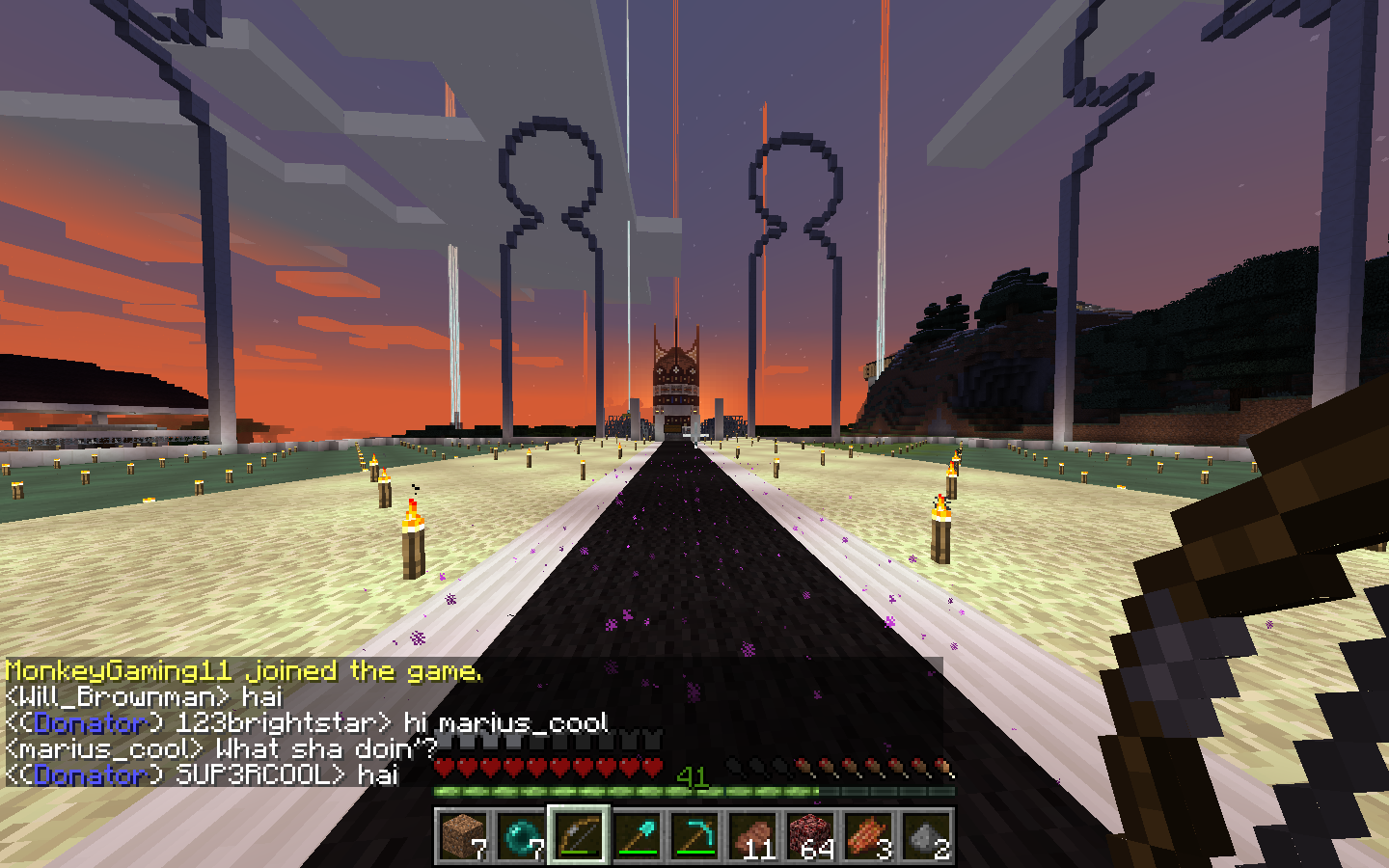
Autcraft is an enchanting place, full of the nicest people you could ever wish to meet. Click to enlarge.
I don’t have autism and I don’t have any family or friends with autism. I’m not a parent and I’m not even a huge Minecraft fan. I just write about interesting people and I happen to know that the most amazing people are often found in the places most people don’t bother to look.
So my outsider status does, I suppose, give me a rare perspective on the Autcraft community.
An Autcraft player called SockFiddler once called me ‘a stranger in a strange town’, which I thought was an amusing description. I would have liked to tell the kids of Autcraft about how, in adulthood, the strange, weird, wonderful, idiosyncratic, unusual, different people are usually the coolest and best people to know. But again, I wouldn’t have believed it when I was their age.
So instead, I hope my post on the bully board has made it clear how the big picture looks to me, as an outsider, passing through: I’ve made friends here. I really hope they take care of each other and, above all, I hope they listen to all the wonderful things that the guardians of this community say about them. Because they’re all true.
If they can do that – if they can truly believe that they are the amazing people that these wise adults know them to be, then the bullies can give them nothing more than cuts and bruises.
And they will heal. mpc

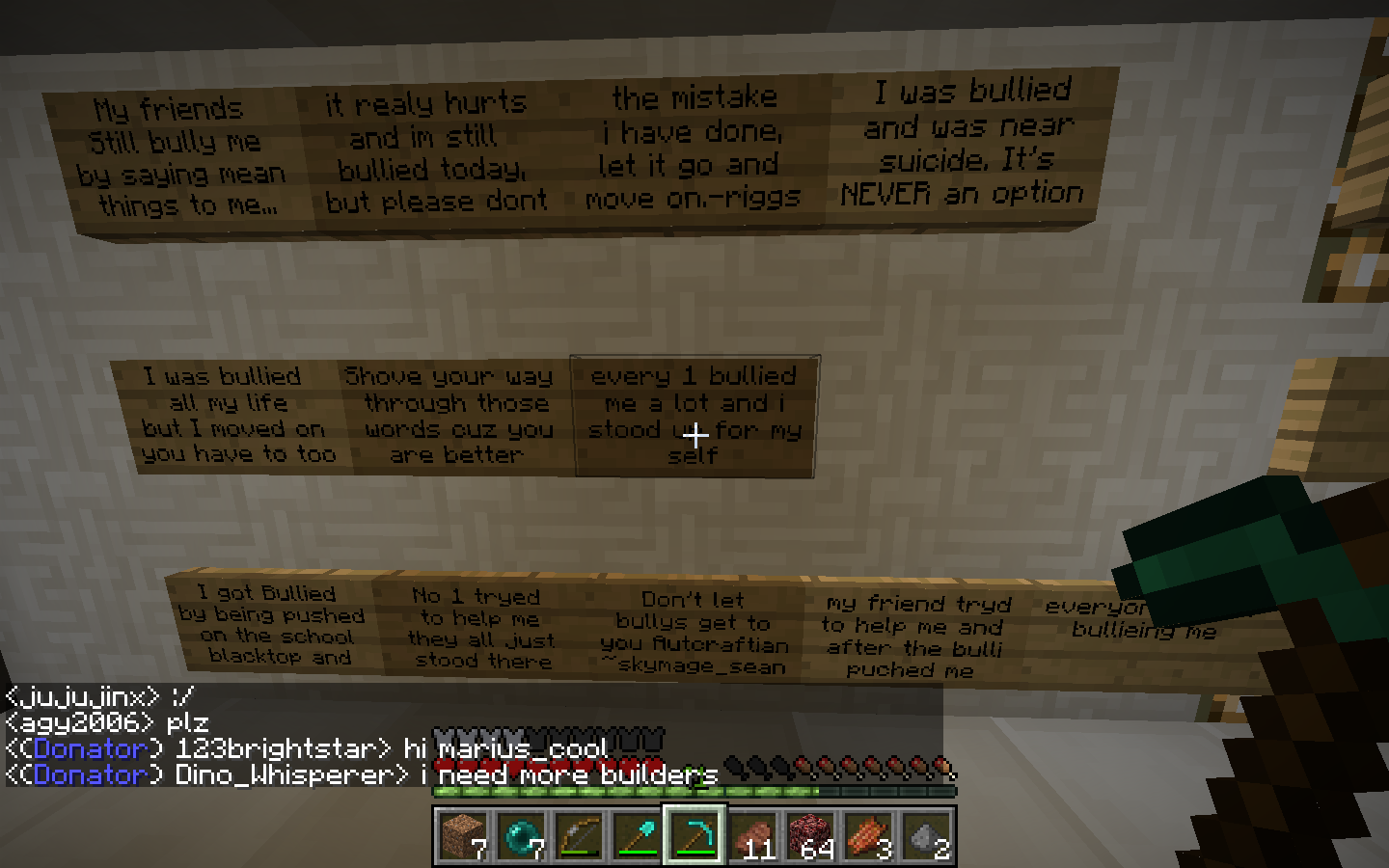
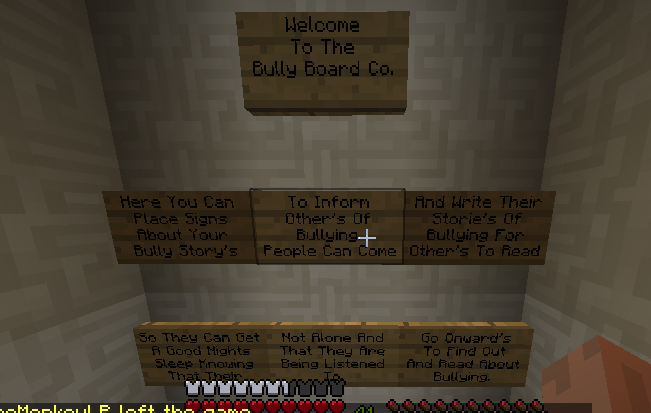
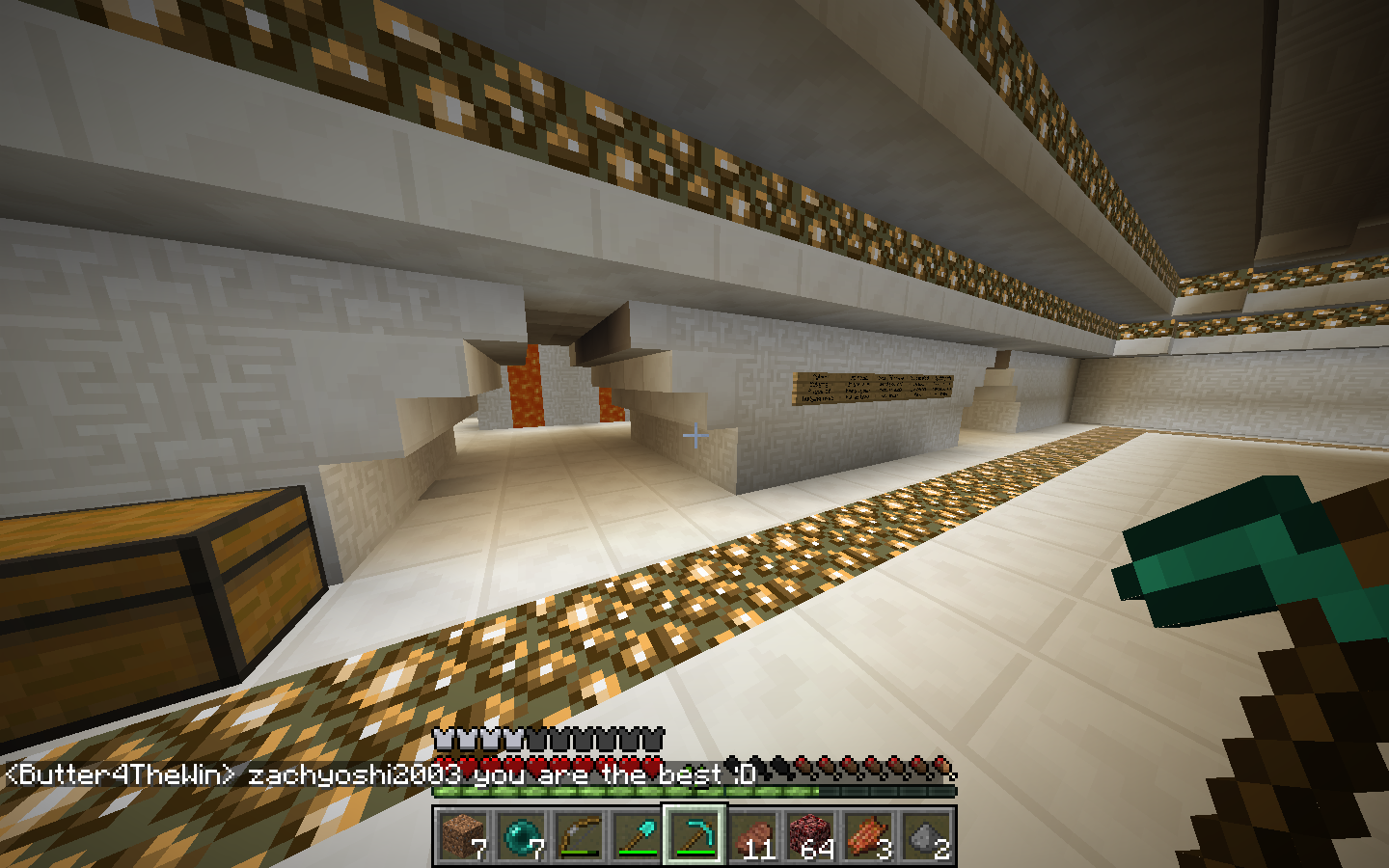
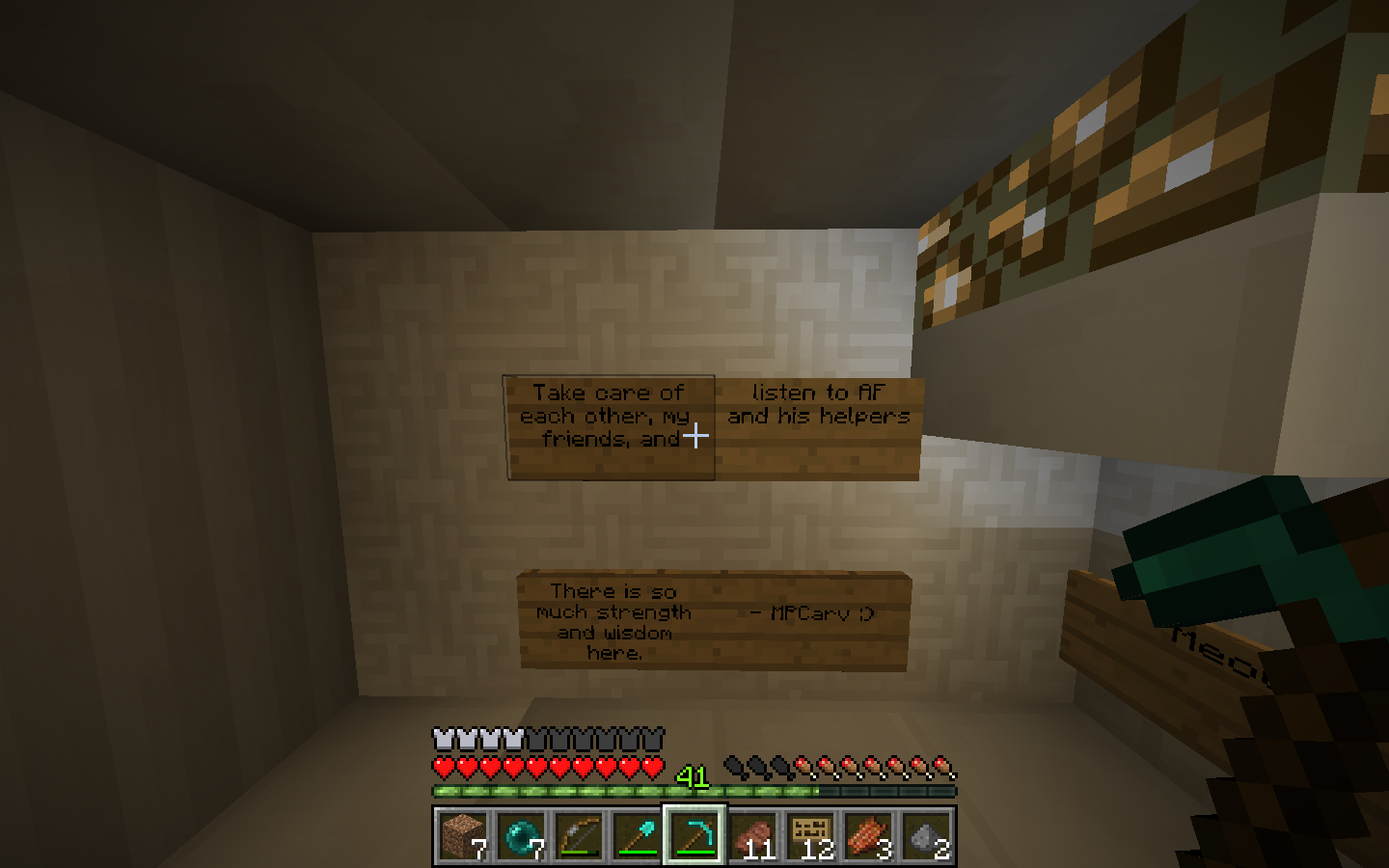
Pro. 10/10.